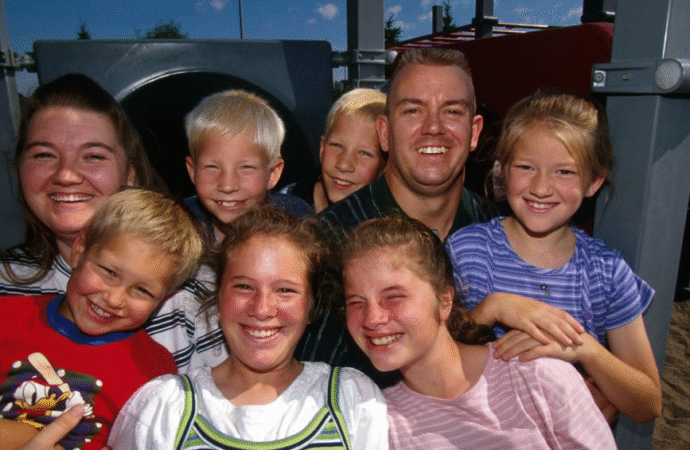The U.S. fertility rate dropped to an all-time low in 2024, according to recent CDC data. Our country’s fertility rate now stands at fewer than 1.6 births per woman, well below the 2.1 children per woman needed to achieve population replacement. Effectively, this means that we’re unable to replace – let alone grow – our population through reproduction. Once the trend toward population shrinkage begins, it’s difficult to reverse.
The problem is global. Twenty-three nations are set to see their populations halve by 2100, according to the BBC. Population collapse could fundamentally reshape societies as they grapple with the impacts on economics, military readiness, healthcare, and culture. Human beings remain the most important resource for any civilization – and we’re on track to run out of them.
So why is the global population, by and large, not replacing itself? A lot of factors contribute to this trend, and, at the end of the day, it remains somewhat mysterious. But we can point to some concrete reasons, outlined in Ross Douthat’s book, “The Decadent Society: How We Became the Victims of Our Own Success.”
Douthat first notes the major economic and cultural shift from agrarian to industrial and urban living. This change from farm to factory to firm “made children less valuable as extra household laborers and made an intense educational investment in each child make far more economic sense – which in turn raised the costs of childrearing for the ambitious and successful.”
In the past, farms – and to some extent, factories – needed large numbers of laborers, who could be relatively uneducated, incentivizing farming families to have more kids. Today, our economy prizes automation and AI, with just a limited number of tech whizzes needed to keep the whole thing running.
The introduction of contraceptives is another factor Douthat raises. These made it possible for people to separate sexual activity from its natural procreative end, and that trend was only exacerbated by the sexual revolution of the 1960s in which sexuality was reframed as purely the pursuit of pleasure, rather than a life-giving act meant to take place within matrimony.
Feminism also urged women out of the home and away from childrearing, while the rise in divorce undercut the longevity of marriages, discouraging couples’ attempts to build large, stable families.
Additionally, the secularization of society removed religious support and motivation for extending the gift of life, while an increasingly comfortable and consumerist society encouraged self-centeredness and physical enjoyment over self-sacrifice. Further, since the sexual revolution, men and women struggle more to establish relationships with each other in the first place, even though most people still say they want relationships, marriage, and children, according to Douthat.
By some accounts, the declining birthrate is symptomatic of societal anxiety over finances. “People are marrying later and also worried about their ability to have the money, health insurance and other resources needed to raise children in a stable environment,” CBS reports. Yet financial constraints to childrearing seem more of a cultural perception problem than actual poverty, given that generations of our forebears successfully raised larger families on less wealth.
According to a Pew survey from 2024, finances aren’t the main reason people are avoiding procreation. For adults aged 18-49, the most common reason given is “I just don’t want to.” This is often because they want to focus on other things, like hobbies, interests, and careers. Interestingly, the third most common reason provided was “concerns about the state of the world.”
These responses suggest that the biggest determining factor in the birth dearth has to do with societal attitudes towards what is most important in life, and whether or not the world is headed in a positive direction. The ideologies most young Americans are formed in focus on personal fulfillment and career achievement over the sacrifice entailed in giving back to society (and one’s own offspring) through childrearing.
Further, since the breakdown of traditional ideas about religion and truth, the world has suffered from a crisis of meaning, epitomized by nihilist philosophers such as Nietzsche. Tragically, mainstream thought has largely turned away from belief in objective truth, and with it, the belief that life has inherent meaning and value.
Ultimately, our failure to reproduce stands as a sign of a profound cultural pessimism, a loss of faith in the value of life itself. Anyone who truly understands the value of life longs to share it through children. Anyone who doesn’t will see little point in reproducing.
Fortunately, some young people are rejecting this anti-life zeitgeist. In certain communities – especially devout religious ones – couples are choosing to have large families, finding greater joy and fulfillment in the process than any hobby or career could provide.
Each new life is like the creation of a whole new world. With each child, parents give someone else the gift of experiencing the world and all that life has to offer. What could be more meaningful than that? It is in the act of giving that we also receive the most. The more we give, the more we are ourselves fulfilled – and there’s no greater gift to give than life. Many young parents today are realizing that parenthood is not only a boon to their children and society, but also a blessing to themselves. And the larger the family, the more abundant the gift.
—
The republication of this article is made possible by The Fred & Rheta Skelton Center for Cultural Renewal.
Image Credit: NARA DVIDS
43 comments















43 Comments
Larissa
August 13, 2025, 4:23 pmI’ve made $84,000 so far this year working online and I’m a full time student. I’m using an online business opportunity I heard about and I’ve made such great money. It’s really user friendly and I’m just so happy that I found out about it. The potential with this is endless.
Here’s what I do… https://www.Paycash1.site
REPLYLorie@Larissa
August 13, 2025, 4:23 pmStart generating extra cash online from home more than $22k by doing very easy work just in spare time. Last month I got paid $22745 from this easy home job. Join this job right now and make more cash every month online. Just follow the web link here to get started Open This
Website….. https://www.Worksprofit1.online
REPLYMarigold Chance@Lorie
August 14, 2025, 6:24 amI am making a good salary from home $4580-$5240/week , which is amazing under a year ago I was jobless in a horrible economy. I thank God every day I was blessed with these instructions and now its my duty to pay it forward and share it with Everyone,.
Here is I started_______ http://Www.EarnApp1.Com
REPLYKarenB@Lorie
August 17, 2025, 6:18 amI get paid over 220 Dollars per hour working from home with 2 kids at home. i never thought i’d be able to do it but my best friend earns over 15k a month doing this and she convinced me to try. it was all true and has totally changed my life. This is what I do, check it out by Visiting Following Website…
REPLY.
.
HERE—————⊃⫸ https://Www.Cash43.Com
RSLewis@Lorie
August 17, 2025, 6:18 amGoogle is now paying $300 to $500 per hour for doing work online work from home. Last paycheck of me said that $20537 from this easy and simple job. Its amazing and earns are awesome. No boss, full time freedom and earnings are in front of you. This job is just awesome. Every person can makes income online with google easily….
REPLY.
More Details For Us→→ http://Www.Payathome9.Com
Tatum Castillo@Lorie
August 18, 2025, 3:59 pmI get paid over 220 Dollars per hour working from home with 2 kids at home. i never thought i’d be able to do it but my best friend earns over 15k a month doing this and she convinced me to try. it was all true and has totally changed my life. This is what I do, check it out by Visiting Following Website
HERE—————⊃⫸ http://Www.CashHive1.Com
REPLYandrew@Larissa
August 14, 2025, 12:47 pmɪᴍ ᴍᴀᴋɪɴɢ ᴏᴠᴇʀ 𝟷𝟹ᴋ ʙᴜᴄᴋs ᴀ ᴍᴏɴᴛʜ ᴡᴏʀᴋɪɴɢ ᴘᴀʀᴛ ᴛɪᴍᴇ. ɪ ᴋᴇᴘᴛ ʜᴇᴀʀɪɴɢ ᴏᴛʜᴇʀ ᴘᴇᴏᴘʟᴇ ᴛᴇʟʟ ᴍᴇ ʜᴏᴡ ᴍᴜᴄʜ ᴍᴏɴᴇʏ ᴛʜᴇʏ ᴄᴀɴ ᴍᴀᴋᴇ ᴏɴʟɪɴᴇ sᴏ ɪ ᴅᴇᴄɪᴅᴇᴅ ᴛᴏ ʟᴏᴏᴋ ɪɴᴛᴏ ɪᴛ. ᴡᴇʟʟ, ɪᴛ ᴡᴀs ᴀʟʟ ᴛʀᴜᴇ ᴀɴᴅ ʜᴀs ᴛᴏᴛᴀʟʟʏ
ᴄʜᴀɴɢᴇᴅ ᴍʏ ʟɪғᴇ…..➤➤ http://www.get.money63.com
REPLYEmmaWright@Larissa
August 14, 2025, 1:59 pmI have made $300 reliably in one day!**That was my ideal day in my life and my boss was to a great degree content with me..CNN is additionally awed from my work and is outstandingly happy**Want the secret?** Copy this Website and choose HOME TECH OR MEDIA…
COPY THIS→→→→ http://Www.CartBlinks.Com
REPLYWendy Kerns@Larissa
August 19, 2025, 11:46 amEarn extra cash every week from the comfort of your home! This flexible part-time opportunity is perfect for anyone looking to make 300-1300 Dollars weekly. Start now and receive your first payment in just a few days. Don’t miss out—join today. Tap on Finance Economy OR Investing.
REPLYHere’s what I do……………….. http://Www.CartBlinks.Com
Heather Delaney
August 14, 2025, 3:32 amAre you searching for a real spell caster ?
REPLYIt is amazing how quickly Dr. Excellent brought my husband back to me.
My name is Heather Delaney. I married the love of my life Riley on 10/02/15 and we now have two beautiful girls Abby & Erin, who are conjoined twins, that were born 07/24/16. My husband left me and moved to be with another woman. I felt my life was over and my kids thought they would never see their father again. I tried to be strong just for the kids but I could not control the pains that tormented my heart, my heart was filled with sorrows and pains because I was really in love with my husband. I have tried many options but he did not come back, until i met a friend that directed me to Dr. Excellent a spell caster, who helped me to bring back my husband after 11hours. Me and my husband are living happily together again, This man is powerful, contact Dr.Excellent if you are passing through any difficulty in life or having troubles in your marriage or relationship, he is capable of making things right for you. Don't miss out on the opportunity to work with the best spell caster.
Here his contact. Call/WhatsApp him at: +2348084273514 "
Or email him at: [email protected] ,
For more information visit his website:https://drexcellentspellcaster.godaddysites.com
Heather Delaney
August 14, 2025, 3:34 amAre you searching for a real spell caster ?
REPLYIt is amazing how quickly Dr. Excellent brought my husband back to me.
My name is Heather Delaney. I married the love of my life Riley on 10/02/15 and we now have two beautiful girls Abby & Erin, who are conjoined twins, that were born 07/24/16. My husband left me and moved to be with another woman. I felt my life was over and my kids thought they would never see their father again. I tried to be strong just for the kids but I could not control the pains that tormented my heart, my heart was filled with sorrows and pains because I was really in love with my husband. I have tried many options but he did not come back, until i met a friend that directed me to Dr. Excellent a spell caster, who helped me to bring back my husband after 11hours. Me and my husband are living happily together again, This man is powerful, contact Dr.Excellent if you are passing through any difficulty in life or having troubles in your marriage or relationship, he is capable of making things right for you. Don't miss out on the opportunity to work with the best spell caster.
Here his contact. Call/WhatsApp him at: +2348084273514 "
Or email him at: [email protected] ,
For more information visit his website:https://drexcellentspellcaster.godaddysites.com
marry
August 14, 2025, 8:16 amThe finest part-time income opportunity to work on mobile or laptop earn more than $500 every day!**In my last month, I earned $22258 by working 3 or 4 hours every day online. Simply visit this website for further information.**Want the secret?** Copy this Website and choose HOME TECH OR MEDIA…
Click here….
http://Www.CartBlinks.com
REPLYLynMTibbs
August 14, 2025, 1:43 pmI get paid more than $120 to $130 per hour for working online. I heard about this job 3 months ago and after joining this i have earned easily $15k from this without having online working skills. This is what I do………………………Www.Works6.Com
REPLY